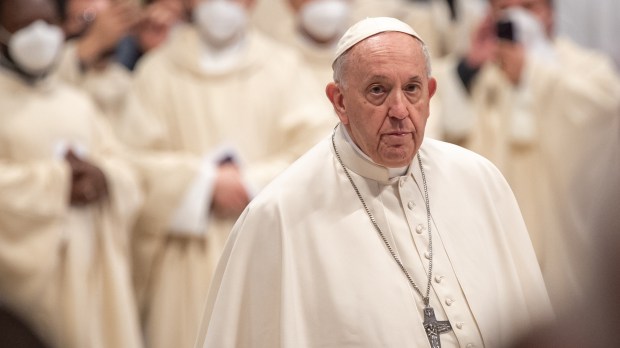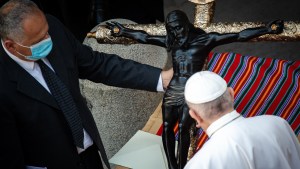Doubting Thomas represents all of us, says Pope Francis, as “we too struggle at times like that disciple: How can we believe that Jesus is risen, that he accompanies us and is the Lord of our life without having seen him, without having touched him?”
Why does the Lord not give us some clearer sign of his presence and love? Some sign that I can see better… Here, we too are like Thomas, with the same doubts, the same reasoning.
The Pope considered St. Thomas before praying the midday Regina Caeli on this Divine Mercy Sunday, April 24. The Holy Father had just given the homily at Mass celebrated before in St. Peter’s Square.
While we are like Thomas, the Pope said, “we do not need to be ashamed of this.”
By telling us the story of Thomas, in fact, the Gospel tells us that the Lord is not looking for perfect Christians. The Lord is not looking for perfect Christians. […] The Lord is not looking for perfect Christians; the Lord is not looking for Christians who never doubt and always flaunt a steadfast faith. When a Christian is like that, something isn’t right.
No, the adventure of faith, as for Thomas, consists of lights and shadows. Otherwise, what kind of faith would that be? It knows times of comfort, zeal, and enthusiasm, but also of weariness, confusion, doubt, and darkness. The Gospel shows us Thomas’ ‘crisis’ to tell us that we should not fear the crises of life and faith. Crises are not sins, they are part of the journey; we should not fear them. Many times, they make us humble because they strip us of the idea that we are fine, that we are better than others. Crises help us to recognize that we are needy: they rekindle the need for God and thus enable us to return to the Lord, to touch his wounds, to experience his love anew as if it were the first time. Dear brothers and sisters, is better to have an imperfect but humble faith that always returns to Jesus, than a strong but presumptuous faith that makes us proud and arrogant. Woe to those, woe to them!
What does Jesus do with Thomas’ absence and “his journey” – this journey “which is often also our own,” the Pope asked.
“The Gospel says twice that he ‘came.’ First once, then a second time, eight days later,” he answered.
Jesus does not give up, he does not get tired of us, he is not afraid of our crises, our weaknesses. He always comes back: when the doors are closed, he comes back; when we are in doubt, he comes back; when, like Thomas, we need to encounter him and to touch him up close, he comes back. Jesus always comes back, he always knocks on the door, and he does not come back with powerful signs that would make us feel small and inadequate, even ashamed, but with his wounds; he comes back showing us his wounds, signs of his love that has espoused our frailties.
Brothers and sisters, especially when we experience moments of weariness and crisis, the Risen Jesus wishes to return to stay with us. He only waits for us to seek him, to call on him, or even, like Thomas, to protest, bringing him our needs and our unbelief. He always comes back. Why? Because he is patient and merciful. He comes to open the upper rooms of our fears and unbelief because he always wants to give us another chance.
Jesus is the Lord of “other chances”: he always gives us another one, always. So let us think about the last time – let’s try to remember a little – that, during a difficult moment or a period of crisis, we closed in on ourselves, barricading ourselves in our problems and shutting Jesus out of the house. And let us promise ourselves, the next time, in our fatigue, to seek Jesus, to return to him, to his forgiveness – he always forgives, always! – to return to those wounds that have healed us. In this way, we will also become capable of compassion, of approaching the wounds of others without inflexibility and without prejudice.


